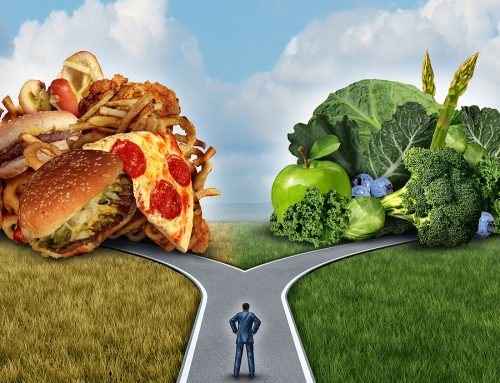Clearly, we have an obesity problem in America and many other countries across our planet. Yet, I propose that we do not have a weight loss problem today. In case you’re confused at this apparent contradiction, consider these statistics:
According to a study from Oxford University published in the International Journal of Obesity, within 3 to 5 years, about 80 percent of all ‘weight losers’ have regained the lost weight, and often gained back a little extra.
According to research by the National Weight Control Registry, that relapse rate may be as high as 95 percent.
For comparison, relapse rates for drug, alcohol and tobacco dependency have been reported in the range of 50-90%.

This means that lots and lots of people have “successfully” lost weight. But not many have kept it off. Therefore, we don’t have a weight loss problem, we have a weight-relapse problem; we have a “not sticking with it” problem, wouldn’t you agree?
In fact, the fall and subsequent weight-regain usually doesn’t take years. Many people have abandoned their new year’s resolutions within weeks. By the time the Super Bowl party rolls around, their diet is history!
If this is true, then shouldn’t we put more of our attention onto figuring out why you haven’t been sticking with your program, and what you should do about it? I made that a prime focus of my book, The Body Fat Solution
I also put together this new list (below) of the top 8 reasons why you fall off the wagon.
Rather than worrying about the minutiae of your diet plan, like whether you should be on low carb or high carb, Mediterranean or Okinawan, vegetarian or meat eater, I propose that if you simply focus on these 8 issues, you’ll start getting more lasting results.
How? By being able to stick with whichever plan you decided was best for you! After all, even if you have the best nutrition program in the world – on paper – it doesn’t do you much good if you can’t stick with it in practice!
THE 8 REASONS
1. No focus: you didn’t set goals, you didn’t put your goals in writing, and or you didn’t stay focused on your goals daily (by reading them, affirming them, looking at a vision board, etc.)
2. No priorities: you may have set a goal, but you didn’t put it on or near the top of your priorities list. For example, your goal is six pack abs, but drinking beer and eating fast food on the weekend is higher on your priorities list than having a flat stomach.
3. No support system: you tried to go at it alone; no buddy system, training partners, family, spouse, friends, mentors or coaches to turn to for information and emotional support when the going got tough.
4. No Accountability: you didn’t keep score for your own accountability – with a progress chart, weight record, measurements, food journal, training journal, and you didn’t set up external accountability (ie, report to someone else or show your results to someone else)
5. No patience: you were only thinking short term and had unrealistic expectations. You expected 10 pounds a week or 5 pounds a week or 3 pounds a week, so the first week you lost “only” 1 or 2 pounds or hit a plateau, you gave up.
6. No planning: you winged it. You walked into the gym without having a workout in hand, on paper, you didn’t plan your workouts into your weekly schedule; you didn’t have a menu on paper, you didn’t make time (so instead you made excuses, like “I’m too busy”)
7. No balance: your diet or training program was too extreme. You went the all or nothing, “I want it now” route instead of the moderate, slow-and-steady wins the race route.
8. No personalization: your nutrition or training program was the wrong one for you. It might have worked for someone else, but it didn’t suit your schedule, personality, lifestyle, disposition or body type.
So there you have it – 8 reasons why most people fall off the wagon! Have you been making these mistakes? If so, the solutions are clear and simple: focus, prioritize, get support, be accountable, be patient, plan, balance and personalize.
Tom Venuto is a natural bodybuilder, fat loss coach, fitness writer and author of Burn The Fat, Feed The Muscle. Tom’s articles are published on hundreds of websites worldwide and he has been featured in Muscle and Fitness, Men’s Fitness, Oprah magazine, The New York Daily News, The New York Times and the Wall Street Journal. He has appeared on dozens of podcasts and radio shows including Sirius XM, ESPN-1250, WCBS and Day Break USA. Tom is also the creator of the new Burn the Fat Body Transformation System and the founder and CEO of the premier fat loss support community, the Burn The Fat Inner Circle.







You need one more reason: depression, stress, feeling like you don’t have full control over your life. People may have the best intentions, drive, and determination to succeed, but life can circumvent our direction from time to time. When life gets really hard, it can be hard to stick to a goal of improved lifestyle, exercise, proper eating, etc.
Tom,That was so right on! Thank-you!
I completely agree with you. Those 8 points do not just apply for weight loss. They are important for all goal setting in life.
Too true! Tom, I just bought Burn the Fat, Feed the Muscle a week ago, and it has ALREADY transformed my fat loss strategy. I had read your Big Fat Lies mini course and have been reading your free stuff for over a year and made a LOT of progress just with that information. Now, with the details and motivational stuff in BFFM, I feel like I’ve already got these eight pitfalls under control. Keep up the good work.Training hard, seeing success,gene
TOM, I ABSOLUTELY LOVED YOU ARTICLE. I JOINED THE GYM LAST JAN AND I HAVE BEEN GOING EVER SINCE. I USED TO GO 5 /6 DAYS A WEEK. I’VE SOMEWHAT SLACKED OFF. AND GOING ONLY THREE OR FOUR DAYS A WEEK. I STILL HAVE THE SAME GOAL AS TO STAY A SIZE 6 AND NOT WEIGH OVER 145 LBS. BUT I DO BELIEVE YOU NEED TO WRITE YOUR GOALS DOWN AND TO SAY THEM TO YOURSELF. YOU ARE SUCH AN INSPIRATION TO ME . THANKS SO MUCH. I CAN HARDLY WAIT UNTIL I’M A PERSONAL TRAINER. I HAVE A PASSION FOR fitness and health. thank you so much for helping to bring more enthusiasm into my life for fitness
While helpful, I think this list is incomplete. As someone who has maintained an 80+ pound weight loss for almost 2 years, I’ve found a few things that are important for successful maintenance.1. You need to change your relationship with food. You need to learn to really enjoy (not just struggle through) eating healthy food in variety. You need to identify and overcome emotional triggers for eating. You need to start equating eating healthy foods in moderation with good feelings, rather than getting that good feeling from overindulgence.2. You need to avoid the denial trap. Weighing yourself frequently (at least once a week) so that you avoid putting on weight in denial. If you face the scales regularly, you need to either accept the fact that you are putting weight back on again (which is hard to do) or, you need to do something about it.3. You need to make up for indiscretions. When you have the unavoidable ice cream or pizza night, enjoy it. But then wake up the next day and realize that you need to offset that indulgence somehow. You can’t just expect those things to be absorbed into your life, because they will be absorbed into your gut.4. You need to enjoy and make a habit of exercise. For me it’s lifting weights. You just need to do it.5. You need to get to a place where you are so happy with your results, you are deathly afraid of going back. Me, I was fat. Then I lost about 85 lbs, and I was actually in GOOD shape. I looked good. I think a problem for lots of people is that they lose SOME weight. They look better, but they’re just less fat. They don’t develop a true sense of pride with their bodies, so it’s easier to let go. When you actually REACH your desired physique, the positive feelings you get from that are not something you want to let go of easily. So, in short, you need to go all the way in the first place, to avoid backsliding.
Tom, I’ll loved your article! 2 points that I feel I must highlight.1. Fat loss is not equal to weight loss. Many people (including myself) get demoralized when they weight the same after dieting, myself included, and give up. However, after I got my fat calipers, I realized that it was working. I was losing fat rapidly – it’s only that I’m genetically predisposed to have heavy bones and a larger frame.2. Little activities help too. For example, instead of driving to the store, take a walk instead. If it’s too heavy for you to carry your groceries in one go, take several trips. Better light exercise than no exercise. Perhaps the gym may seem daunting initially, but the trick is to start small and get your body used to physical activity.Thanks Tom! I frequent your site so regularly! :)
Great blog and great information! I’ve been reading you for a few weeks andyou are such a positive contributor to improving people’s health! I justbought a book called “How to Lick The Sugar Habit”. So far a compelling andVERY motivating book on how to cutsugar addiction.
This is a great list Tom… even as a personal trainer I need to review some of these steps to make sure I am nailing every single one of them.I finally got your new book yesterday (I’m in Australia) and can’t wait to get into it. I have already made a decision to buy it for every single one of my clients that haven’t already purchased through my numerous emails.As always, thank you!
Dear Tom,Your information is brilliant and easy to understand.We all need motivating and you certainly do that.I appreciate the time and effort you put into yournewsletters. Thanks.Anna.
Brilliant post and everyone should keep those reasons in mind all the time regardless of weight.I was wondering if you had information of that study in the International Journal of Obesity, its name, publication year etc. I would really like to read it.
rainy; thanks for the comments,the journal citation for that statistic is below. Also look up rena wing and the national weight control registry for further information on weight maintenancehttp://www.ncbi.nlm.nih.gov/pubmed/12861237Int J Obes Relat Metab Disord. 2003 Aug;27(8):955-62.Weight maintenance and relapse in obesity: a qualitative study.Byrne S, University of Oxford, Department of Psychiatry, Warneford Hospital, Oxford OX3 7JX, UK.OBJECTIVE: To investigate, among women with obesity who have lost weight, the psychological factors associated with successfully maintaining the new lower weight, as opposed to weight regain. DESIGN: Qualitative research methods (in-depth individual interviews and group interviews) were used to assess the characteristics of successful weight maintainers, as compared with weight regainers and healthy-weight women.SUBJECTS: In all, 76 females were recruited from the community, comprising 28 formerly obese women who had lost weight and maintained their new lower weight for at least 1 y; 28 obese women who had lost weight but regained the weight that they had lost; and 20 women with a stable weight in the healthy range.RESULTS: Certain psychological factors were identified which characterised the regainers but not the maintainers. These factors were: failure to achieve weight goals and dissatisfaction with the weight achieved; the tendency to evaluate self-worth in terms of weight and shape; a lack of vigilance with regard to weight control; a dichotomous (black-and-white) thinking style; and the tendency to use eating to regulate mood.CONCLUSION: The results suggest that psychological factors may provide some explanation as to why many people with obesity regain weight following successful weight loss. The factors identified in this study need to be examined further using prospective designs.
Brilliant. Thank you very much for the link to the study. Being a health psychologist I find the psychological factors very interesting, especially how the regainers tend to evaluate their self-worth in terms of weight and shape and the dichotomous thinking style. This all-or-nothing type of thinking is very common especially among women, when they cheat a little on their diet they go into a “f**k it” mode and just pig out, thinking “I’ve ruined the diet anway” I think this is a big factor in weight regain, and failure to lose weight.
Thanks Tom,I am reading your Burn the Fat and Feed the Muscle for a second time. It really makes sense because I am an Endomorph with Syndrome “X” and hypothyroidism. It is soooooooo hard to lose weight, even on blood sugar meds and synthetic thyroid pills.I have begun cardio on my lunch hour, and going to the gym after work at least 4 days a week. I enjoy reading your blog posts because it has helped me gain insight that I am just one of those people who will always have to work my behind off in order to lose weight.After being diagnosed with the chalenges mentioned above, I was still “achey” in my joints. My doctor tested my Vitamin D levels and I almost had Rickets due to extra low levels!!!! So the conclusion to this post for people becoming fit or staying healthy: get to a doctor and have a complete check up periodically to make sure your insides are nourished and working properly, especially if you have certain conditions that make it a little harder to lose weight.After taking super amounts of Vitamin D, I feel great and my recovery from working out so hard, is much quicker. Instead of being sore for three or four days after a hard work out, it only lasts maybe two days. The soreness isn’t bad and I can actually stay active to work out with the soreness when before I couldn’t move!So people go to the doctor and have a good physical every year and note how you feel to your doctor. It litterally saved me from misery.
Thanks for the list Tom! As always you provide valuable insight for some of the very pitfalls I’m facing today. I injured myself while doing cardio at the gym a few months ago (pulled muscle in my leg) and it’s preventing me from doing any leg-cardio for a few months. I let myself get discouraged and lost sight of my goals, and stopped doing any form of cardio rather than to look for alternatives and keep working out.Thanks,Jon
It is important to have a clear goal in mind.